Affiliate marketing is where you promote another company’s product or service in exchange for a commission. When people click your link and buy the product or service, you make money.
It is absolutely not a scam.
- It is legal, as long as you comply with relevant laws and regulations in your country. For example, here are FTC’s guidelines.
- It is ethical, as long as you disclose your relationship as an affiliate and only promote products you believe in.
Many websites earn money this way, including major ones like the New York Times, The Verge, NerdWallet, and more.
The real question is… is it worth your time?
Given that it’s the monetization method most people have succeeded with, it seems the answer is yes.
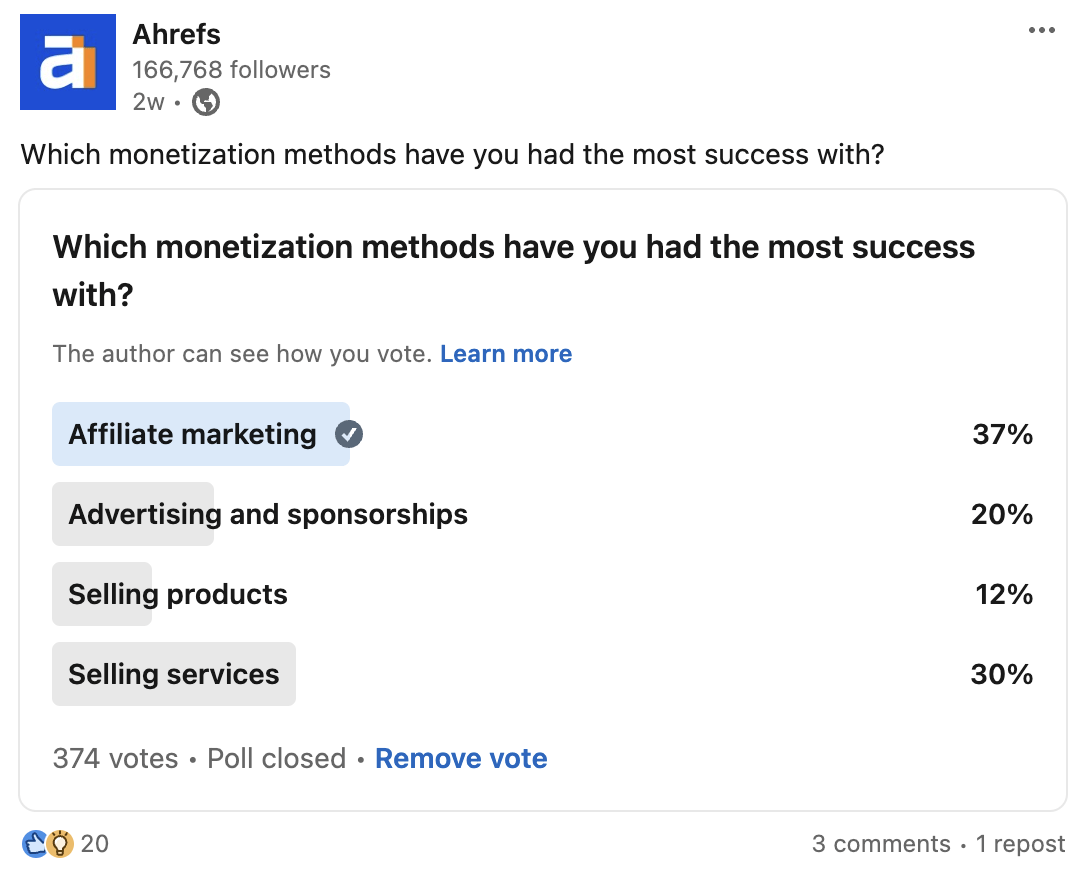
There are plenty of examples of folks making fat stacks with affiliate marketing, too.
- Entrepreneur Pat Flynn made around six figures in just one month in 2017.
- Living Cozy, an independent affiliate website (i.e., not associated with any major brands), achieved more than $12 million in revenue.
- Another independent site, Grilling Dad, generated over $25,000 per month.
- MoneySmart, Asia’s NerdWallet, made $29 million in 2022.
- DogFoodAdvisor, a dog food affiliate site, was acquired for $9 million.
- Wirecutter (now part of the New York Times) was acquired for $30 million.
That said, it’s no get-rich-quick scheme. The process is simple, but not easy. It takes tons of investment and time before you start earning anything, and you need to know what you’re doing, especially when it comes to SEO.
But if you’re willing and able to dedicate your time, energy, and money to affiliate marketing, it can be worth it.
Affiliate marketing itself is not a scam, but like any industry, it has its share of fraudulent activities.
Here are three major ones to look out for:
Pay-to-join affiliate programs
As its name suggests, you have to pay a fee to join these affiliate programs. Don’t.
Real affiliate programs are always free to join. After all, there is no downside for the merchant, as they only pay you for each sale.
Fake gurus, courses, and training programs
In the affiliate marketing industry, fake gurus are people who sell courses on how to do affiliate marketing (or make money online) but have no real-world experience. Their main money maker is not affiliate marketing but the course they’re selling you.
As a result, these courses or training programs are typically underwhelming, generic, and likely do not deliver on their promises.
For example, years ago, before I started working as a digital marketer, I read Tim Ferriss’ 4-Hour Workweek and became interested in making money online. So, I signed up for a two-day offline workshop for a hefty sum in Singapore.
The workshop was incredibly underwhelming. Most of the participants needed help even double-clicking icons. I wasted two days on what could have easily been a three-hour workshop. For the price I paid, it was indeed a scam. True enough, later on, I found out the instructor was a well-known “fake” guru (I was green and didn’t know it back then).
I want to help you avoid my fate, so here are some red flags to spot:
- Unrealistic promises — If it sounds too good to be true, it probably is.
- Pressure tactics — They read Cialdini’s book once and spammed you with urgency and scarcity. Especially if they’re fake (“How does an online course run out?”)
- Image over value — Rather than provide free content, their marketing and positioning are all about how luxurious their life is, how many sports cars they have, and how much money they make. Just know that their cars are usually rented and their revenue numbers doctored.
- Questionable success stories — They have “social proof,” but they look suspiciously fake. Generic names or no photo IDs. And these days, AI-generated images and testimonials.
- No proof of their own success — They have no case studies or sites of their own to show. If they have charts (usually up and to the right), it’s fake or stolen. Check if you can ask them for their actual sites, then plug that site into our free traffic checker to see if it’s actually generating search traffic. (If they refuse to show you their site, it could be a telltale sign.)
To find good instructors and courses, invert everything above and find instructors that:
- Don’t overpromise. They should give realistic expectations.
- Don’t use pressure tactics. If there’s urgency to their offer, it should be legitimate (e.g., it’s a live cohort class, so there can only be that many people).
- Provide free and valuable content that proves their expertise.
- Have real (and independent) success stories you can find on social media, forums, Reddit, etc.
- Have proof of success (e.g., they got acquired for $X and it was reported in the news; they flipped their site, and there’s proof on a marketplace like EmpireFlippers).
Dodgy, low-quality, or scam products
It’s tempting to promote a product just because it offers high commissions. But you’ll be damaging your reputation if you end up promoting subpar, low-quality, or worse, products that don’t exist.
For example, My Top Tier Business (MTTB) was a product that many affiliate marketers used to promote.
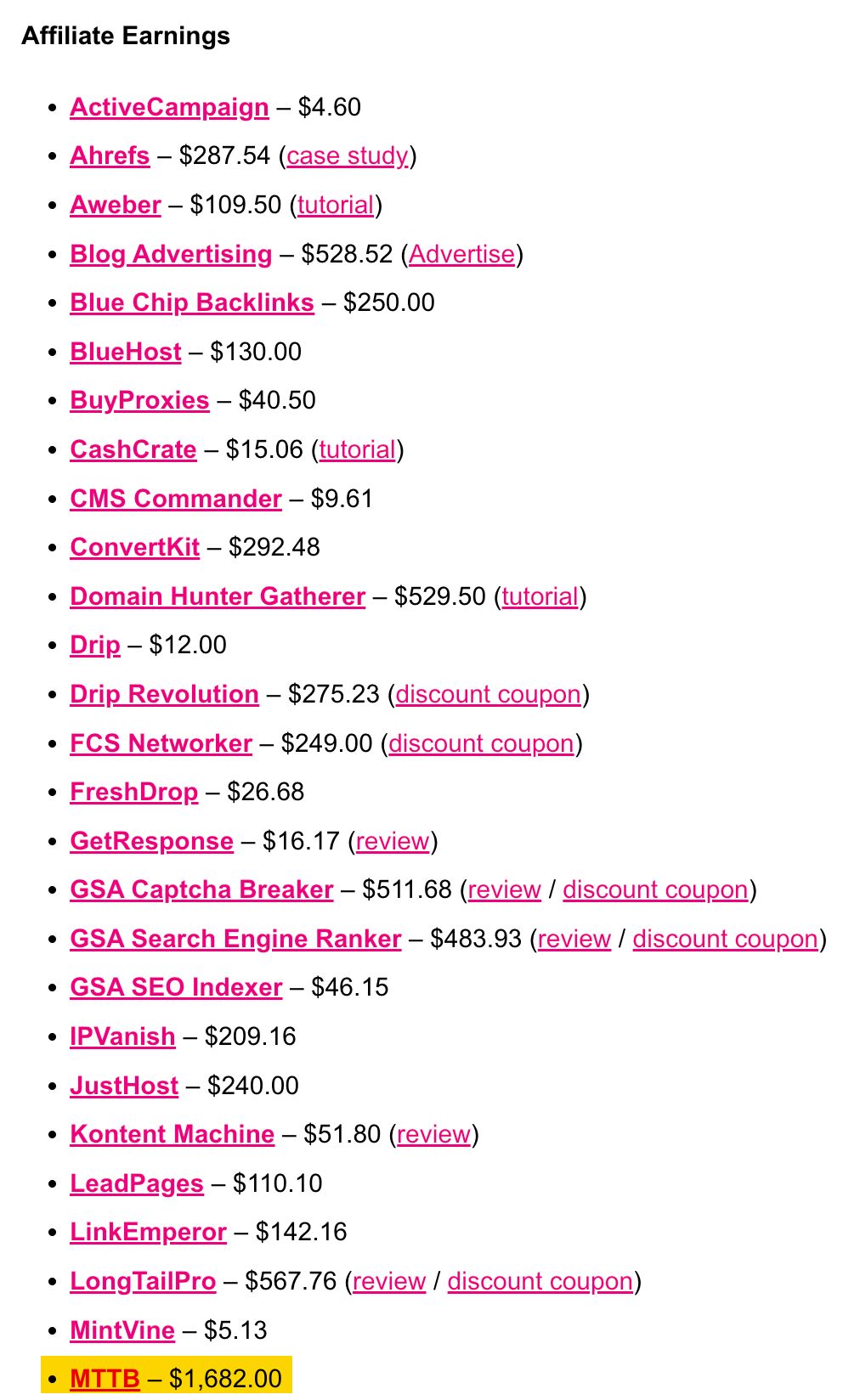

In 2018, the FTC charged MOBE (the parent company) with fraud and halted the entire business. Some of the prominent affiliate marketers for that company were even charged. MOBE eventually settled with the FTC.
So, as much as possible, you’ll want to avoid promoting terrible stuff. Here’s how to avoid the dodgy ones:
- Check if the affiliate program is genuine. Find out if the company is legit, the affiliate managers are real people, and if they’ve actually worked with other affiliates. If you know anyone who has participated in the program, ask them for their review.
- Test the product. You should already be doing this anyway, but you’ll be surprised how many affiliate marketers don’t. Using the product also helps with E-E-A-T, which is important if you rely on search traffic for your affiliate site.
- Choose reliable and reputable affiliate networks. These networks will help curate products that are authentic.
- Prioritize your audience. The simplest way, though perhaps not the most lucrative, is to promote only products you’ve used and believe in.
- Trust your gut. If you feel something is off about the product, even if you can’t explain it tangibly, don’t promote it.
Convinced that affiliate marketing is worth your time? Here are the basics to get you started:
1. Choose your niche
A niche is your area of focus. For example, while it’s not my idea of fun, your website could be all about vacuum cleaners.
An ideal affiliate niche has four qualities:
- High-paying affiliate programs
- High traffic potential
- Low competition
- A topic you’re interested in
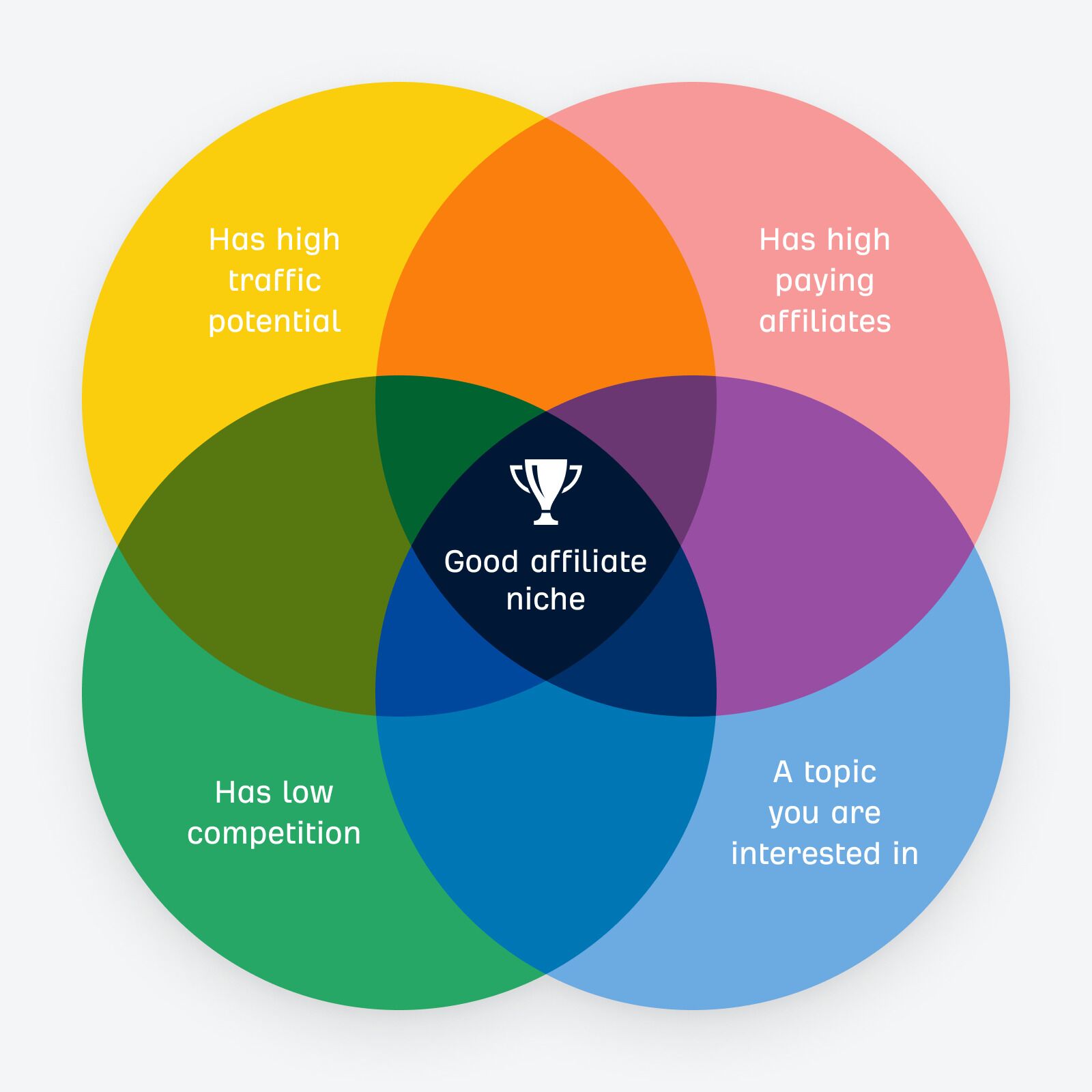

How do you find a niche that matches all four? Here’s one way:
- Go to Ahrefs’ Keywords Explorer
- Enter a topic you’re interested in
- Go to the Matching terms report
- Add an Include filter for words like “best” and “review” (the reason: Most affiliate sites make money from articles targeting keywords like “best [products] or [product name] review”)
- Add a Lowest DR filter for a maximum of 30
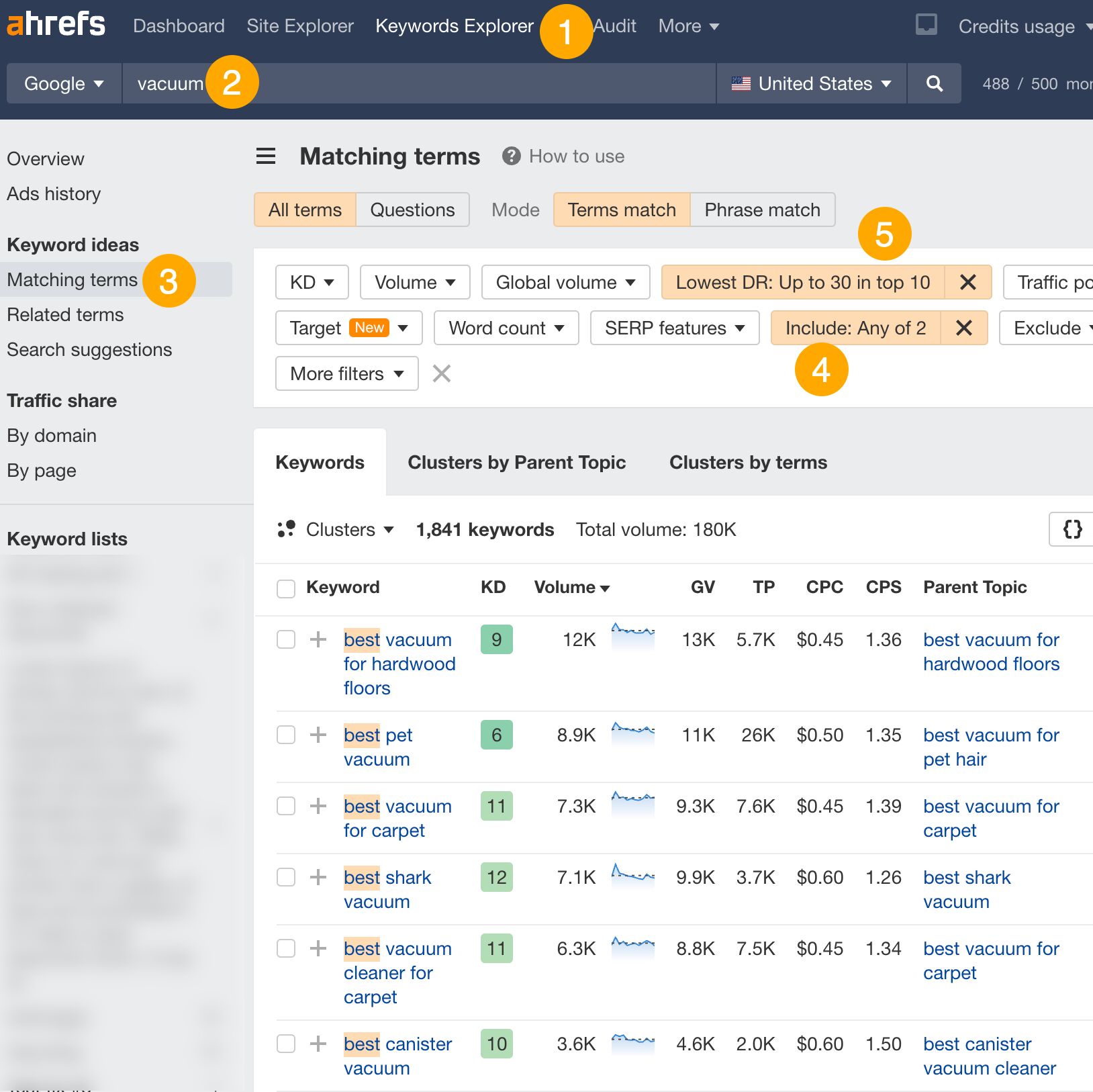

Looking at the report, we can see that the niche we’re interested in (“vacuum cleaners”) is a decent niche because:
- There are keywords with good traffic potential and low difficulty. For example, the keyword “best vacuum cleaner for carpet” has a TP of 7,500, a low KD of 11, and a low DR website already ranks in the top 10.
- Vacuum cleaners are generally not cheap, so affiliate payouts can be significant.
- There are plenty of affiliate programs around, such as Amazon Associates and even Dyson.
I’ll leave it up to you to decide if you fulfill the final quality of interest in vacuum cleaners.
2. Decide on your platform
While you can do affiliate marketing on any platform (e.g., YouTube, TikTok), I recommend building a website and focusing on search engine optimization (SEO).
This post lists 8 reasons why SEO is important, but the biggest one is that search traffic is passive and consistent. This is important because consistent traffic translates to consistent clicks on your affiliate links.
3. Find affiliate programs to join
The easiest affiliate programs to join are Amazon Associates and those from big-box retailers like Target. You can also find programs on popular affiliate networks like AvantLink, ShareASale, and Commission Junction.
If you already use a product, see if they have an affiliate program. If they don’t, ask if they would be willing to build an affiliate relationship with you.
4. Create high-quality content
You already know what content you need to create from your niche research. For example, for our hypothetical vacuum cleaner site, you’ll definitely want to create content around the “best vacuum cleaners,” “best pet vacuums,” “dyson cordless vacuum review,” etc.
Make sure you’re actually testing these products and not simply copy-pasting from other articles. In their Helpful content guidelines, Google explicitly states that’s what they’re looking for:
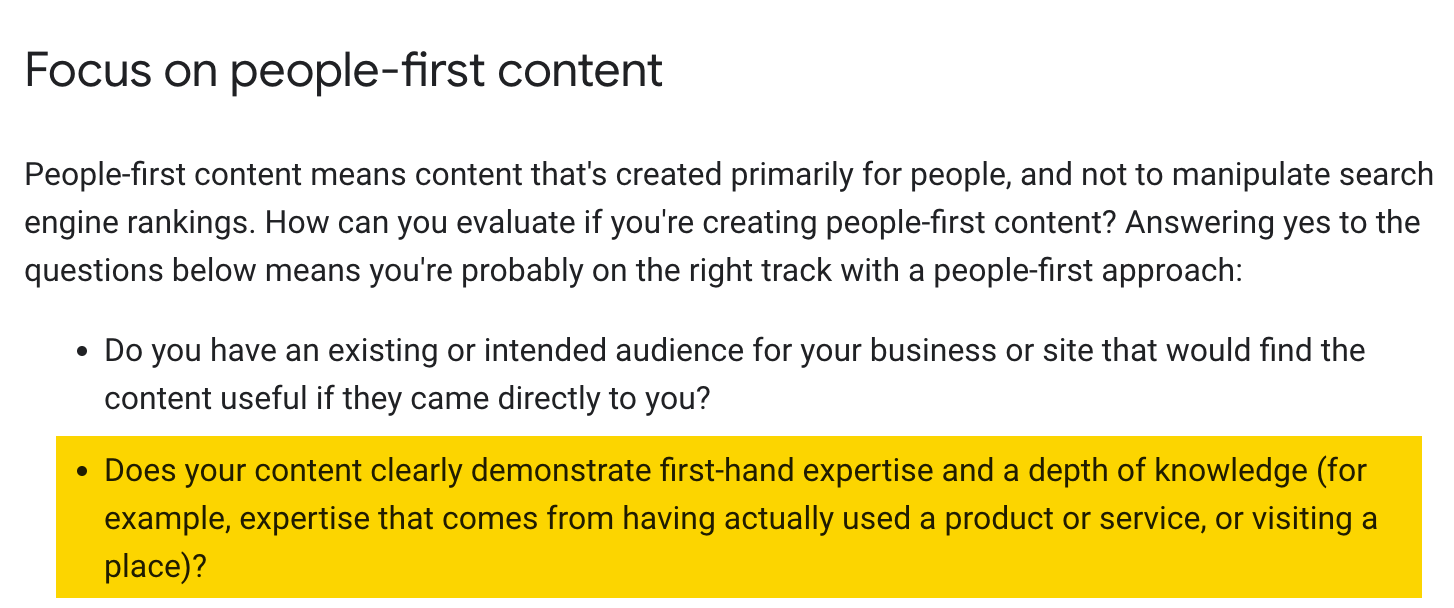

It’ll be easy to create articles for those topics and call it a day. But that’s not enough. One reason: Links. They’re an important Google ranking factor, and in the real world, you’ll find it difficult to get other websites to link to such pages (also known as “money pages”).
For that reason, you also want to create other types of content. These could be linkbait or informational content.
In fact, when I interviewed Dustin Christiansen, the founder of Territory Supply, years ago, he told me that was his affiliate site’s content strategy:
[…] we also do a lot of content that isn’t related to products or affiliate marketing at all – like hiking and camping guides that include the best locations to explore in different areas. These articles are research-intensive and we try to find writers who live in or explore the areas we write about so that they have real, accurate value for our readers. We do so much more than just product-based content that I think it helps find an audience that a lot of affiliate sites might miss out on.
One quick way to find informational topics to target is to enter your niche into Keywords Explorer, go to the Matching terms report, and switch the toggle to Questions.
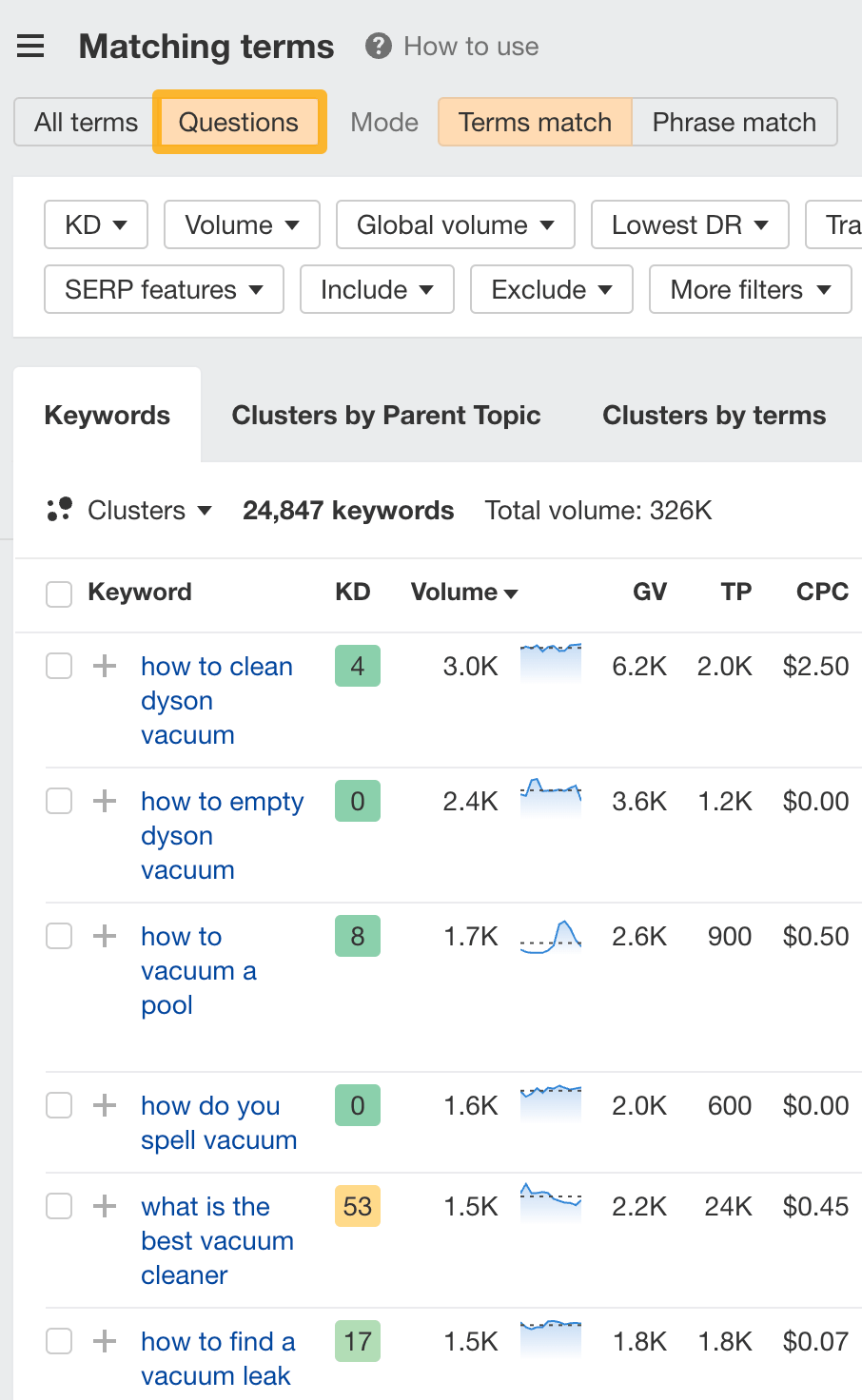

Eyeball the list and target the topics that are relevant to your site.
Learn more
Want to learn more about affiliate marketing? We have tons of resources, so check them out:





